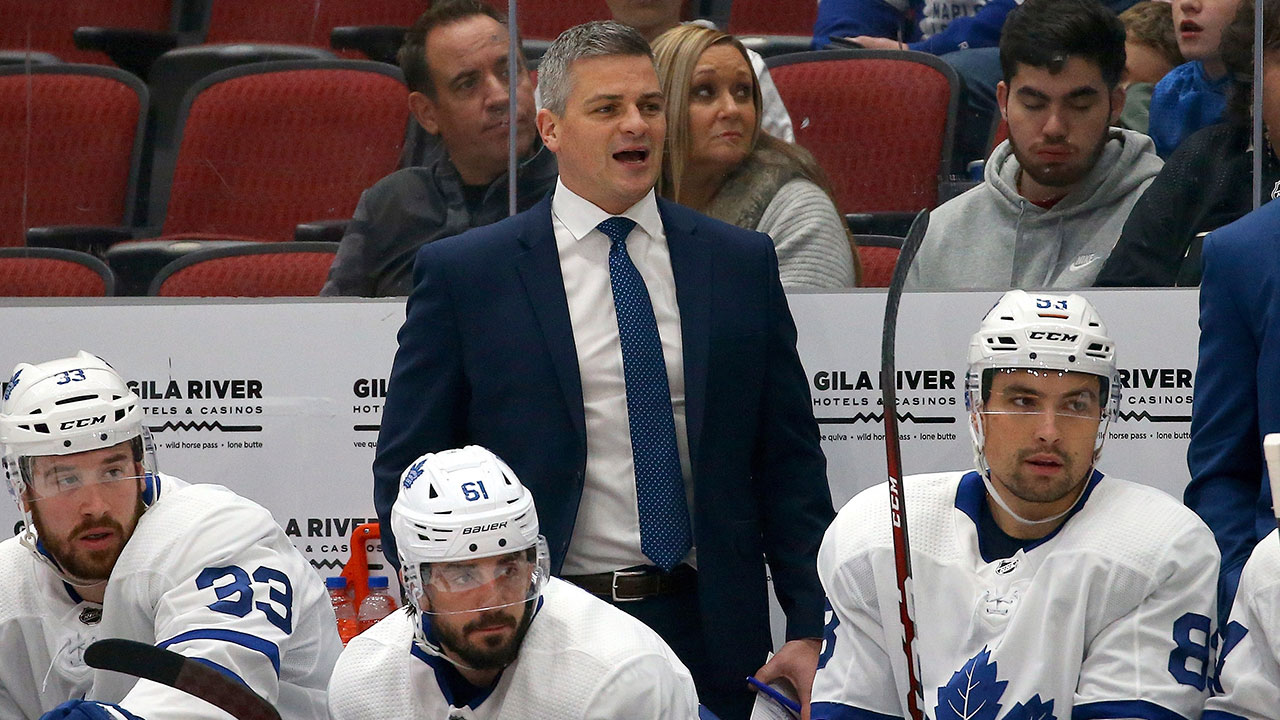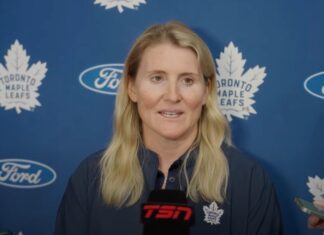Toronto Maple Leafs head coach Sheldon Keefe joined TSN Overdrive on Friday evening, discussing the increase in ice time for his star forwards, Auston Matthews’ offensive tear, the Matthews-Marner combination, and Travis Dermott joining the matchup pairing in the absence of Jake Muzzin.
It’s a big game on Sunday with where you are at in the standings. It feels like a four-team race in the Atlantic and you’ve yet to play Florida yet. You’ve got four games left against the Panthers. Are these games going to feel bigger because of who you are playing and the significance of it?
Keefe: Yeah, we think so. We haven’t talked about that with the players here yet. We will, of course, touch on it. As a staff, we’ve discussed these games here not just against the Panthers but the games in the state of Florida in general with Tampa later on in the schedule. They’re going to be important. All of the divisional games are important. As we’ve turned the half to the second half of the season here, every one of them will be big. We recognize that and we’ll have to be prepared for it.
The likes of Matthews, Tavares, Marner, and Nylander are playing a lot of minutes and are obviously performing for you. Do you have a number in mind before you go into the game, or are you just playing it by feel, and if they get to 24 or 25 minutes, so be it?
Keefe: I don’t overthink it other than to say I want to have our best people really involved and engaged in the game, especially early. I’m comfortable if I get to around seven or eight minutes for those types of games in the first period. I’m generally okay with that. That tells me I’ve given them an opportunity to really get themselves engaged in the game but also give us what we feel is our best opportunity to get a hold of the game and get a lead and get ahead. We can adjust from there.
Sometimes it works out well and they finish in a more comfortable range if we do get a lead and we start to use our bench and depth more to protect the lead. For the most part, I am really just feeding off their body language. I’ll often ask them on the bench how they are doing and how they are feeling. I try to make the appropriate call within that game but, of course, also keeping in mind what might be upcoming in the schedule and the bigger picture over the course of a long season. You’ve got to be mindful of it all.
We’ve got to give those guys an opportunity to put us in spots to win games.
One guy’s body language who must be pretty good on the bench is Auston Matthews. What is it like to have a front-row seat to watching the tear he is on right now?
Keefe: It has been fun. He is really feeling it. The biggest thing that I really like is how he is commanding the puck both offensively and defensively — the way he is skating and moving his feet. Whether it is to get available for his linemates to get him the puck or getting it back for the opposition quickly, he has been pretty determined that way.
That has been the nicest thing here. We have given guys more opportunities here and more ice time. We haven’t seen it negatively affect their work habits or details or anything like that. Of course, that is something I am monitoring and looking at and talking to them about. We are trying to maintain a high level of play. That can’t fall by the wayside. Auston certainly has done that and it has been really good for him and our team.
There wasn’t a ton of sample size of Marner and Matthews playing together before you got behind the bench, but there was enough and it never really felt like they clicked. Why do you think it is working now with those two players?
Keefe: Really hard to say. It’s hard to say if there is a why it works now and why it hasn’t in the past. I don’t know how consistent it has been in the past or what have you. It’s not something that we’ve discussed, frankly. A lot of the decisions I’ve made I’ve communicated with players and gotten their perspective on. This one sort of happened in-game when we were struggling as a team and nothing was really happening. We just made the switch to try to get something moving. Things really did get moving for us. We haven’t changed it since. It has gone really well.
When you really step back from it, you have an elite passer and playmaker like Mitch Marner, and an elite shooter like Auston. It makes a lot of sense. They seem to enjoy playing together. It’s worked well for us in the last little bit. We hope it continues, and if not, we’ll adjust it back and see how things go. It makes some sense to me. Despite the fact that Hyman – Tavares – Marner was a very dynamic line for us, we like what we have in it right now.
Do you find you’re spending more time with the players you haven’t coached as opposed to the guys you have coached with the Marlies? Do you feel you need to have more conversations with the guys that don’t really know your program as well?
Keefe: Yeah, definitely. That has been a big part of it for me here. It has been a big benefit for me to have established relationships with the guys I’ve coached with the Marlies. I’m trying to be mindful of not taking those relationships for granted and making sure I’m still spending time with them and communicating with them regularly.
Obviously, those that I haven’t coached are also really significant pieces to our team and require my time and communication with them — getting a feel for where they are at. what their thoughts are, and all of those types of things.
It is definitely an area I am spending quite a bit of time on. They have been really good about providing feedback and being honest and really helping me to coach them.
You pulled Frederik Andersen earlier this week for the first time. He was frustrated. You were frustrated and said after the game you weren’t happy with your team’s play against Edmonton. Freddy came out the next day and said, “I was not angry or frustrated with Sheldon,” but he went on to say something along the lines of, “I know he likes to shake some things up to keep the team on their toes.” That is one thing that has stood out since you got here — line juggling, moving pieces around. How does that philosophy apply to Freddy, though? Are you going to treat your goaltender — specifically him, with that type of workload — differently in terms of messages and how you want to try to spark him compared to other players on the team?
Keefe: Yeah, of course. I think the goaltender is a very unique position and it needs to be handled in a unique manner. That decision that was made in that game was a combination of wanting to shake up the team a little bit and get them to respond and get their attention. You can only call so many timeouts and things like that over the course of a season to expect those things to work.
We’ve given up two goals on the first two shots coming out of the first intermission — a time that I had attempted to get their attention and get us to change the way we were playing. That clearly didn’t work. A timeout would be useless given that case. I wanted to shake the team up.
Also, we are down 3-0 and it doesn’t seem like much is going our way. I don’t feel that is the type of game that we need to have Frederik Andersen playing in. We can’t talk in one side of our mouth about his workload and managing that and at the same time having him play in a game in which the probabilities of us coming back are extremely slim. That is ultimately why I made the decision.
I appreciate the fact that Freddy is such a competitor and wants to be in the net. We love that about him. but also, I think he understands the bigger picture. As he wakes up the next day, I think he recognizes that.
Between that game and the game Wednesday night against Winnipeg, you made the announcement and determination that Travis Dermott would start taking up a bigger role and maybe you would notice or we would notice publicly him playing more minutes in different situations. Take us through that thought process — why now for an expanded role for Dermott?
Keefe: There is a nice sample here; I am not certain the number of games he’s played since coming back from his injury, but it’s a long road coming back. Any time you don’t get a training camp and exhibition, it takes a while to get up to speed. We think there has been more than enough time for that to occur.
Of course, right now, we have the injury to Jake Muzzin, which has allowed us the opportunity to utilize extra minutes that are available. We opted initially to give Martin Marincin those minutes in an effort to get him up to speed knowing that we were going to be missing Muzzin for a significant piece of time. We thought we needed someone to come in and play regularly. Marincin hadn’t played any minutes at all since I had been here and we wanted to get him confident and feeling good. We feel like we’ve accomplished that.
Now it is time for Dermott to take a step we all feel he is capable of taking.
Morgan Rielly said recently he was injured earlier in the year and he feels he is starting to get better and is closer to 100%. Are you seeing that? How comfortable are you with Morgan playing big minutes?
Keefe: I am comfortable with it. I am definitely starting to see that — both in his play and also just in watching him around the arena and around the building every day. I’ve had communications with him in terms of how he is feeling in particular practices and all of that type of stuff. It appears to be moving in a positive direction. Obviously, that is a very big and important sign for our team.

































